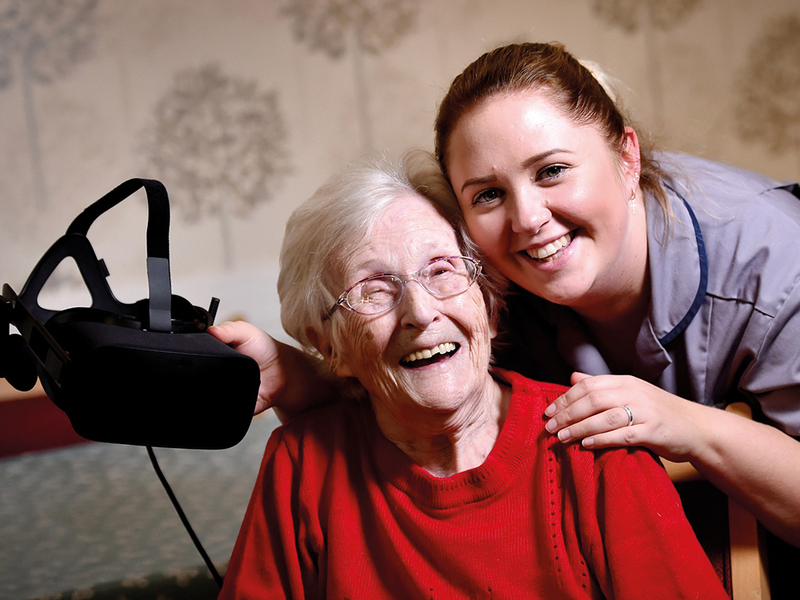“Care is no longer about keeping someone alive, it’s about giving them quality of life”
By Andrew Pirie
In today’s world, we are living longer than ever before. This is bringing new challenges to those working in adult services. We find out how a Staffordshire Care Home has taken an innovative approach towards their care services and discover why it’s so important for social workers and healthcare professions to pay attention to mental health. Vicky Smith, Principal Care Home Manager at Samuel Hobson House and its sister home Mayfield House, tells us what she thinks.
Sitting back on a comfortable armchair, listening to the soothing sounds of a musician playing a beautiful melody on the piano, the audience is rapt. The atmosphere is calm, peaceful and harmonious. Some are so relaxed they nod off; others listen intently; a few grab an instrument themselves and join in with the music.
But this isn’t a piano bar in the West End, this is Samuel Hobson House care home in Newcastle-under-Lyme, Staffordshire. And this is one of just many activities that have been introduced to improve the mental health of our residents. Others include intergenerational activities with local children, exercise classes and virtual reality.
Like the rest of the health and social care sector, residential care is changing – with more focus on taking a holistic view on supporting service users. This marks a distinct shift in thinking from traditional practices which focused on physical and medical needs and has clear benefits for both the residents and the staff who work in care settings.
I have worked in care for 15 years and have seen tremendous changes during that time. When I first started my career, the focus was on the practical side of care – primarily making sure residents were bathed, dressed and fed. If they seemed unwell, we would seek support for their physical ailments and there was little emphasis on their mental wellbeing. There’s been a huge shift in this way of thinking.
The mental wellbeing of our residents is a top priority. We continuously monitor how they are feeling so that we can respond quickly if someone seems down or not quite themselves. It’s no longer about keeping someone alive; it’s about giving them quality of life.
The care homes are a sister company to Acacia Training, which specialises in apprenticeships, short courses and government funded qualifications to the health care, social care and early years sectors. This has real benefits for the staff because it means that we have access to the latest training – from dementia care to mental health first aid.
We have introduced a number of regular activities, all designed to improve the mental health of the 80 older people who reside across the two care homes. They include the musician who brings his piano in every week and encourages residents to pick up instruments and play along with him, and a local children’s music and movement class, Boogie Beat, which holds workshops at the home. Young and older generations can take part in activities together, like making Easter bonnets or singing songs.
Local fitness trainer Andy Lewis, who specialises in training for people with complex mental needs, also visits the home regularly. He encourages the residents to take part in interactive exercises, like “climbing mountains” and “canoeing” all from the comfort of their armchair. One lady, who is very quiet and rarely talks, claps her hands and stamps her feet with anticipation every time she sees Andy arrive.
We even have virtual reality equipment so residents can trek through the jungle on safari, visit Blackpool Pier or sit on the beach of a tropical island. They were some of the first in the UK to benefit from the technology, ImmersiCare, which was specially designed for use in care homes and hospitals, particularly for people with dementia. These activities are small things on their own but they’ve had a huge impact on the residents’ wellbeing.
Other changes include encouraging residents to make their room or flat as personal to them as possible to create a homely environment and including family in their care plan. We get family members involved as much as possible. If a resident isn’t settling well or doesn’t seem themselves, we work with their family to find a resolution and come up with ideas for what we can do to make them feel better. We had one lady who was very agitated when she first arrived and spent all day in her room. Through working with her family and putting tailored measures in place to improve her mental health, the change in her wellbeing was huge. She began sitting in the lounge with the other residents, taking part in activities and going on trips to the shops.
I’m a qualified mental health first aider after taking part in an accredited two-day Mental Health First Aid training programme, provided by Acacia Training. Since it introduced the course, the company has trained over 150 people in health and social care.
The course made me so much more aware of what is going on around me and helped me to notice when something isn’t quite right, whether that’s a passing comment or a post on social media. This has had tremendous benefits both to the residents and to the staff and since I completed my training, I’ve signposted three staff members to the relevant agencies or places to get the support they need to improve their wellbeing.
We ask ‘how are you’ every day, but most of the time we’re just on autopilot. Take the time to really listen to the answer. We all have to support each other.
Acacia Training can offer health and social care professionals dedicated training to ensure that all staff are aware of the signs that somebody may be affected by mental distress. To find out more about their training programme, visit their website or give them a call on 01782 646346.
